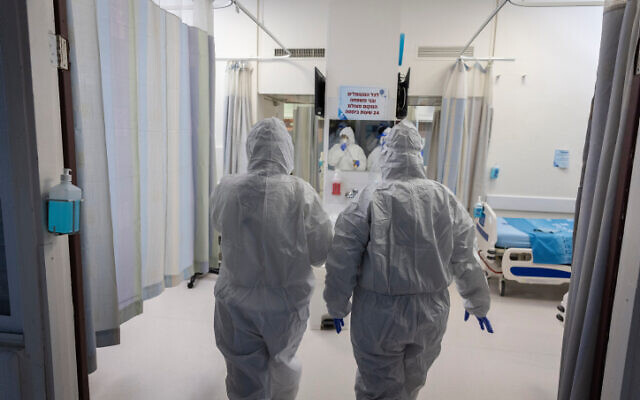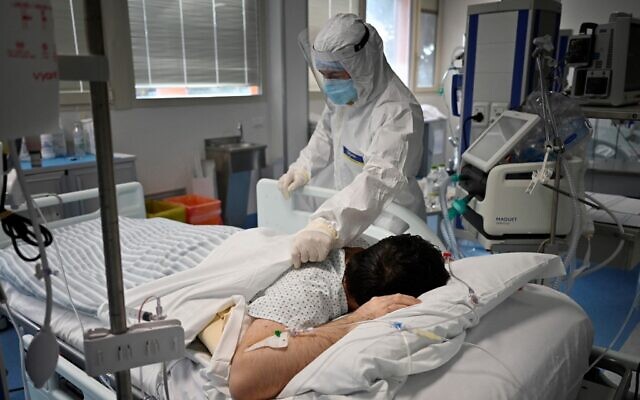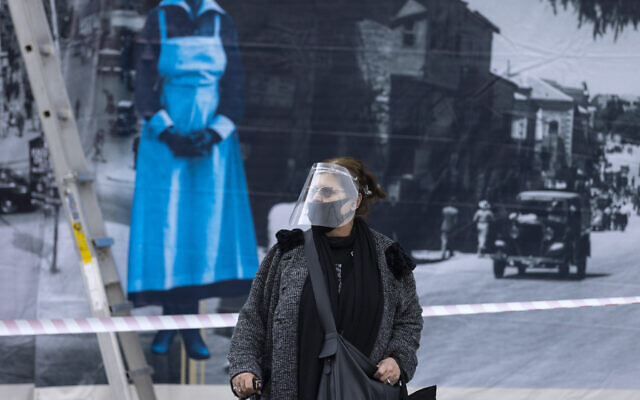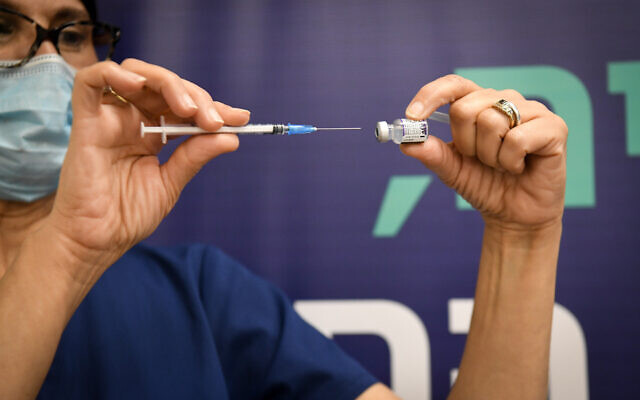Israeli authorities on Thursday imposed new restrictions on gatherings, the health ministry said, as the number of coronavirus cases rose above 4,000 daily infections.
Ministers fine tuned rules requiring green passes for outdoor cultural or religious events with 100 or more people, and the head of the health ministry signed a directive to slap a half-size mask mandate on outdoor gatherings. The moves were shown by New Year’s fun-goers to stave off a fearful spike in new cases spreading the ultra-infectious Omnikron variant.
The new rules were in effect until Thursday evening, the health ministry said, although they would only come before Knesset MPs early next week for necessary approvals.
Previously, only outdoor gatherings of 1,000 people or the presentation of green passes, which are given to those who have been fully vaccinated or have recently recovered from the virus, were granted. Non-vaccinated attendees must submit a negative COVID-19 test.
Israel lifted an outdoor mask mandate in April and only recommended that they be worn at large gatherings. The new rules would require them in gatherings of 50 or more people.
The new directives were announced Thursday evening, after experts told Prime Minister Naftali Bennett that Israel would soon reach 20,000 cases a day.
Thursday saw 4,085 new cases between midnight and 10:30 am, with the final daily tally expected to be much higher. On Wednesday, 4,061 new cases were confirmed. This number is the highest seen in Israel since the end of September.
The spike, thought to be largely fueled by the Omicron variant, has pushed active infections past 22,000 – more than double the figure recorded a week ago.
With the rising morbidity figures, the serious cases reached 92 on Thursday night. Of those patients, 45 were defined as severe. Most critically ill patients are not vaccinated.
The Health Ministry said the infection rate stood at 1.62, the highest level since the end of June.
The Weizmann Institute, which advises the government, Prof. Eran Segal said the rising number of cases is closely tracked with previously presented figures to the government, predicting that Israel will reach a record number of daily infections by next week, a previous high of nearly 10,000. will break the level.

Medical workers at Hadassa Ain Kerem Hospital wear protective gear as they work in the hospital’s newly reopened COVID ward on December 27, 2021 in Jerusalem. (Olivier Fitoussi/Flash90)
“It looks like it will continue at the same pace for at least two more weeks,” he told Channel 12 news. “At the peak, we will reach 20,000 to 30,000 cases a day, although I am not sure we will be able to measure this as we will be limited in our ability to test so many people in a day.”
Several other countries are already seeing record-breaking cases.
Omicron has pushed infection levels in the United States, Britain, France and other European countries to record levels in recent days, forcing governments to impose restrictions.
The number of daily new Covid cases worldwide crossed one million for the first time, according to an AFP tally on Thursday, with more than 7.3 million in the past seven days.
Omicron has begun affecting some hospitals in the US, the hardest-hit country, with a seven-day average of new cases to 265,427, according to the Johns Hopkins University tracker.
Harvard epidemiologist and immunologist Michael Mina tweeted that the count was likely just “the tip of the iceberg”, as the true number was likely far higher due to a lack of tests.

A medical worker visits a patient in the COVID-19 Intensive Care Unit at the Institute of Clinical Cardiology in Rome on December 30, 2021. (ALBERTO PIZZOLI/AFP)
In Israel, the number of hospitalized patients has been quite low, with indications showing Omicron may be less harmful than previous variants.
However, some experts told Bennett on Thursday that the health system was in danger of collapsing, Channel 12 News reported. According to the report, others warned that staffing shortages would be seen outside the health system as more people are forced into quarantine. A report by the Hebrew University presented to the government earlier in the month predicted that by the end of January, the number of serious cases could be between 1,000 and 2,500.
Bennett on Tuesday called for an easing of quarantine rules, saying the previous regimen could lead to a “lockdown by another name.”
Health Minister Nitzen Horowitz vowed on Thursday that a lockdown was “not on the table”, even as he said officials were preparing for a higher infection rate than ever before.
“We are prepared for a large number of infections and are prepared for all possibilities. The situation is under control. We prepared and practiced in advance and Israel is in a much better position than the world. We gained valuable time for quick and balanced actions, but that doesn’t mean we can be complacent,” Horowitz said.

People walk with face masks on Jaffa Street in Jerusalem on December 29, 2021. (Olivier Fitoussi/Flash90)
“We will continue to live with the coronavirus,” he said.
Israel’s government has sought to avoid restrictions on general movement during previous waves of the virus, instead relying on high vaccination rates and a robust booster program.
Health Ministry Director-General Nachman Aish said on Thursday that Israel will begin giving the fourth dose of the COVID vaccine to people with immunosuppression.
In a press conference, Ash said the decision was made “due to concerns that they are more vulnerable.”
Last week a panel of health experts approved the introduction of a fourth dose for Israelis over 60 and other at-risk Israelis, but Ash decided not to sign off on the recommendation.
Ashe said Thursday the panel’s approval meant he could decide when he would be fit to be allowed vaccination with a fourth shot.

A health worker reads a COVID-19 vaccine shot at Sheba Medical Center in Ramat Gan on December 28, 2021. (Yossi Zeliger/Flash90)
Meanwhile, major retailers have threatened to strike if the government does not amend other new rules limiting purchases, saying they are seriously hurting their revenues by failing to curb infection rates. Huh.
“We warned that morbidity would not subside and that’s what happened,” said Turgmann, head of the Association of Retail Chains.
“It’s a fake green pass,” Turgman said of requiring only people with certificates to be allowed in large stores, while most are allowed in most shopping mall spaces at all.
He called on the government to scrap the rules that came into force on Sunday or face a general strike by next Tuesday.